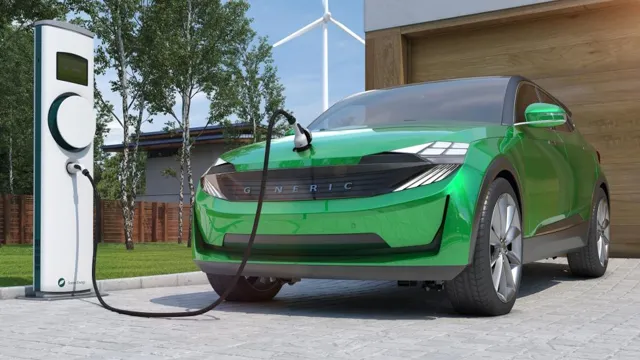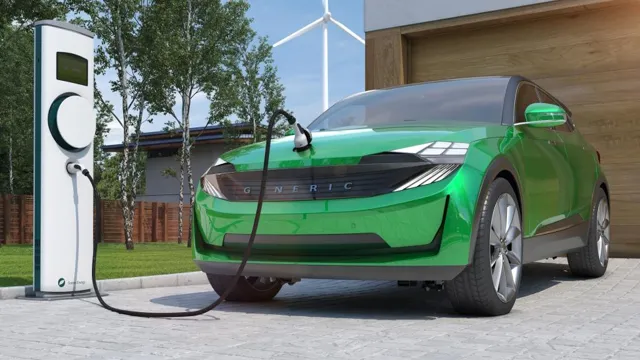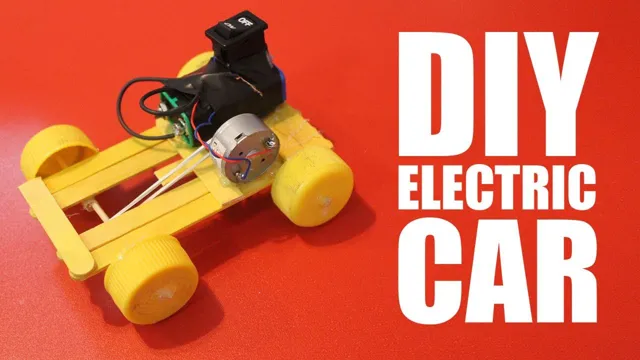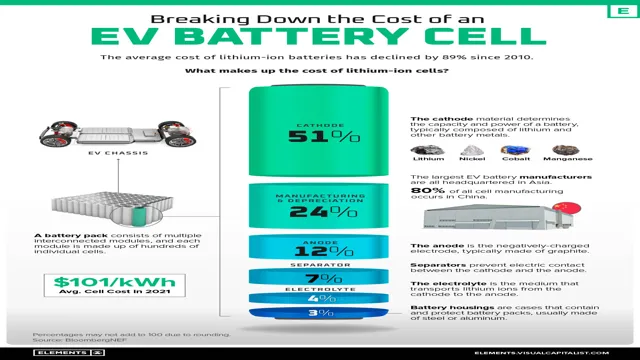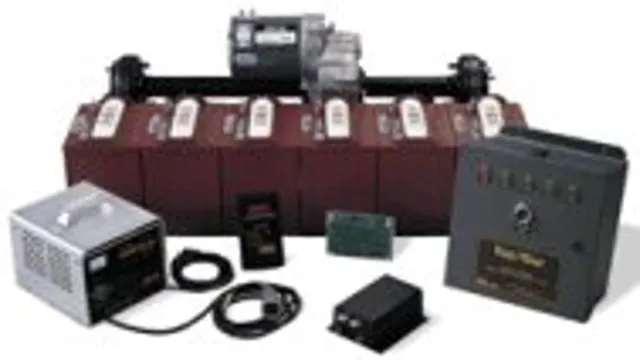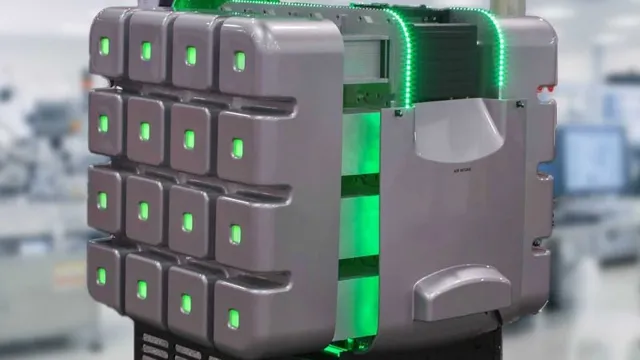Juicing Up: The Revolution of Lithium Ion Batteries in Electric Cars
Electric cars have been around for decades, but their prominence is increasing rapidly, and so is the demand for reliable and efficient batteries. One such battery that has overtaken the market is the Lithium-Ion battery. These batteries can store large amounts of energy, allowing electric cars to travel long distances on a single charge.
As a result, they have become the preferred power source for most electric cars today. In fact, many car manufacturers have started planning their production around the capabilities offered by these batteries. However, while Lithium-ion batteries offer a plethora of benefits, they also come with their own set of limitations.
Let’s dive deeper into the world of electric cars and Lithium-ion batteries and explore their impact on our future.
What Are Lithium-Ion Batteries?
Yes, many electric cars do have lithium-ion batteries. These types of batteries have become increasingly popular due to their high energy density, which allows for longer driving ranges and quicker charging times. Lithium-ion batteries operate by using lithium ions to transfer between two electrodes, allowing for the storage and transportation of electrical energy.
In addition to their use in electric cars, lithium-ion batteries are also commonly found in smartphones, laptops, and other portable electronics. While they do have certain advantages, lithium-ion batteries also have some drawbacks, such as their tendency to overheat and degrade over time. Despite these limitations, the widespread adoption of electric cars means that lithium-ion batteries will continue to play a crucial role in powering our vehicles and reducing our reliance on fossil fuels.
Composition & Characteristics
Lithium-Ion Batteries are a type of rechargeable battery that has gained widespread popularity in recent years. They are composed of two electrodes, a cathode (positive) and an anode (negative), separated by an electrolyte and housed in a metal or plastic casing. The lithium-ion chemistry involves the movement of lithium ions between the two electrodes during charging and discharging.
These batteries have a high energy density, meaning they can store a significant amount of energy in a small size, making them particularly suitable for use in portable electronic devices such as smartphones and laptops. Furthermore, they have a low self-discharge rate, meaning they can hold their charge for several months without significant loss of power. With advancements in technology, they have also become more affordable, environmentally friendly, and safer than their predecessors.
Lithium-ion batteries have indeed transformed the way we consume and use energy, and their future looks bright.
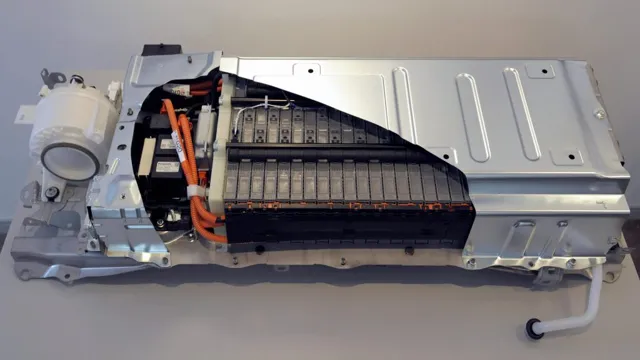
Usage in Consumer Electronics
Lithium-ion batteries have become increasingly popular in consumer electronics over the past decade. These batteries use lithium ions to store and release energy, providing high power and long-lasting performance. Unlike traditional alkaline batteries, which have a limited lifespan and must be replaced frequently, lithium-ion batteries can be recharged and used for years without losing their effectiveness.
This makes them ideal for use in smartphones, laptops, tablets, cameras, and other portable devices. Additionally, they are lightweight and compact, making them a convenient choice for people on the go. Overall, lithium-ion batteries are a game-changer in the world of consumer electronics, offering reliable and long-lasting power for all our devices.
Electric Cars & Battery Technology
Yes, electric cars typically use lithium-ion batteries. In fact, these types of batteries have become the industry-standard for electric vehicles due to their high energy-density and long life-span. Lithium-ion batteries are capable of storing large amounts of electrical energy and are rechargeable, making them perfect for powering electric cars.
These batteries hold enough charge to allow electric cars to travel for hundreds of miles before needing to recharge. Furthermore, lithium-ion technology continues to evolve and improve, allowing for even greater range in electric cars while reducing charging times. Brands like Tesla and GM use lithium-ion batteries in their electric cars, and it’s likely that as the electric vehicle market expands, so too will the demand for lithium-ion batteries.
Lithium-Ion vs Other Types of Batteries
When it comes to electric cars and battery technology, the choice of batteries is crucial. Lithium-ion batteries have become increasingly popular due to their high energy density, longer lifespan, and faster charging times. However, there are other types of batteries such as lead-acid, nickel-cadmium, and nickel-metal hydride that are still used in some electric vehicles.
Lead-acid batteries are cheaper but heavier, and have a shorter lifespan. Nickel-cadmium and nickel-metal hydride batteries offer higher efficiency and longer lifespan than lead-acid batteries but have lower energy density. While lithium-ion batteries are currently the most popular choice, the future of electric cars may depend on further advancements in battery technology.
It’s clear that the development of batteries that are cheaper, lighter, and have even higher energy density will have a significant impact on the range and affordability of electric cars.
Benefits of Lithium-Ion Batteries in Electric Cars
Electric cars have been gaining popularity in recent years, and with the advancements in battery technology, it’s no surprise. Lithium-ion batteries have become the go-to option for electric cars due to their energy density and ability to hold a charge for a long time. Compared to traditional lead-acid batteries, lithium-ion batteries are more efficient and have a higher capacity to store energy.
This means that electric cars can travel further on a single charge and have a longer lifespan. Lithium-ion batteries also have a faster charging time, making it more convenient for on-the-go charging. Additionally, they are also lightweight and don’t take up much space, allowing for more space in the car for passengers and cargo.
Overall, the benefits of lithium-ion batteries in electric cars are clear and have contributed to the growth of the electric vehicle market.
Charging & Replacement Considerations
When it comes to electric cars, one of the most important features is their battery technology. However, it’s not just about the type of battery but also the charging and replacement considerations. Charging an electric car can take a few hours or more, depending on the battery’s size and the type of charger used.
For this reason, it’s essential to plan ahead when taking a long trip to ensure that you don’t end up stranded. Replacement batteries are also a consideration, and while some manufacturers offer long warranties that can cover battery replacement, it’s essential to know how much it will cost to replace a battery once the warranty expires. Overall, the key to maintaining an electric car’s battery life is to recharge it after every use and follow the manufacturer’s recommended maintenance schedule.
By doing so, you can enjoy all the benefits that come with driving an electric car, which includes being eco-friendly, cheap to operate and maintain.
Major Electric Car Brands & Their Batteries
Yes, electric cars do have lithium-ion batteries, and in fact, many of the major electric car brands use them in their vehicles. For example, Tesla uses lithium-ion batteries in its Model S, Model X, Model 3, and Model Y. Nissan’s LEAF also uses a lithium-ion battery pack, as do the Chevrolet Bolt EV and the BMW i
Lithium-ion batteries are popular in electric cars because they have a high energy density and can store a lot of energy in a relatively small size. This allows electric cars to have long ranges and fast acceleration times. Additionally, lithium-ion batteries have a long lifespan and can be recharged many times without significant degradation, making them an ideal choice for electric car batteries.
Overall, lithium-ion batteries are an important component of electric cars and are a key driving force behind the rise of the electric vehicle market.
Tesla: A Leader in Lithium-Ion Battery Technology
When it comes to electric cars, the battery technology is just as important as the car itself. Different major car manufacturers use different types of batteries in their vehicles, and it’s important for consumers to understand the differences. One brand that has gained a reputation as a leader in lithium-ion battery technology is Tesla.
Tesla’s batteries are made up of thousands of small lithium-ion cells that work together to power the electric motor. These batteries are known for their high energy density which allows Tesla cars to have long driving ranges compared to other electric vehicles on the market. Additionally, Tesla’s batteries are designed to have a longer lifespan than other batteries, making them a reliable choice for consumers.
With the increasing demand for electric cars, car manufacturers are constantly working to improve their battery technology, but for now, Tesla remains at the forefront.
Other Electric Car Brands & Their Batteries
When it comes to electric car brands, there are several players in the game. Tesla is undoubtedly the most well-known, with its sleek and high-performing cars. But other brands are making their mark too.
BMW, for example, offers the i3, which uses a lithium-ion battery pack. Nissan’s Leaf also uses a similar battery technology. Chevrolet’s Bolt uses a nickel-rich lithium-ion battery pack, which helps it achieve a range of over 200 miles on a single charge.
It’s interesting to see how each brand approaches the battery technology in their electric cars, and the trade-offs they make in terms of cost and performance. Despite these differences, all these brands share a common goal: to provide a cleaner and more sustainable mode of transportation for the masses.
The Future of Electric Cars & Batteries
Yes, electric cars do use lithium-ion batteries as their power source. In fact, the majority of electric cars currently on the market utilize these types of batteries due to their high energy density and long lifespan. However, there is much ongoing research and development into alternative battery technologies that could provide even greater performance and sustainability.
For example, solid-state batteries are being tested as a potential replacement for lithium-ion batteries in electric cars. These batteries offer higher energy density and faster charging times, but are still in development and not yet widely available. Overall, there is no doubt that electric cars and their batteries will continue to evolve and improve in the years to come, making them an increasingly attractive option for environmentally conscious drivers.
Conclusion
In conclusion, the question of whether electric cars have lithium ion batteries is answered with a resounding “yes.” Despite the strong opposition from traditional gasoline enthusiasts, the shift towards electric vehicles is gaining momentum. Lithium ion batteries have proven to be a dependable and efficient source of power for these eco-friendly machines.
So, for those who prefer a quieter, more environmentally conscious ride, it’s time to plug in and charge up with a lithium ion battery!”
FAQs
What type of batteries are used in electric cars?
Most electric cars use lithium-ion batteries for energy storage.
Are there any other types of batteries used in electric cars?
Some electric cars also use nickel-metal hydride (NiMH) batteries or solid-state batteries.
How long do lithium-ion batteries last in electric cars?
Lithium-ion batteries in electric cars typically have a lifespan of 8-10 years or 100,000-150,000 miles.
Can lithium-ion batteries be recycled?
Yes, lithium-ion batteries can be recycled and their materials can be repurposed for new batteries or other products.
